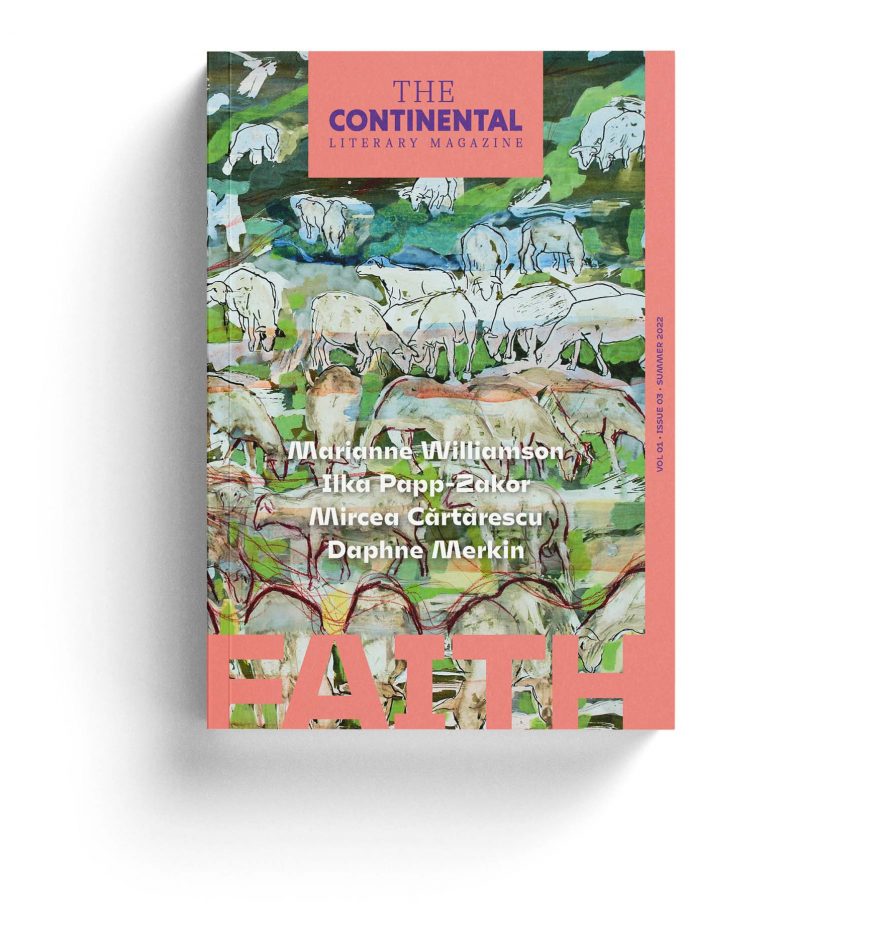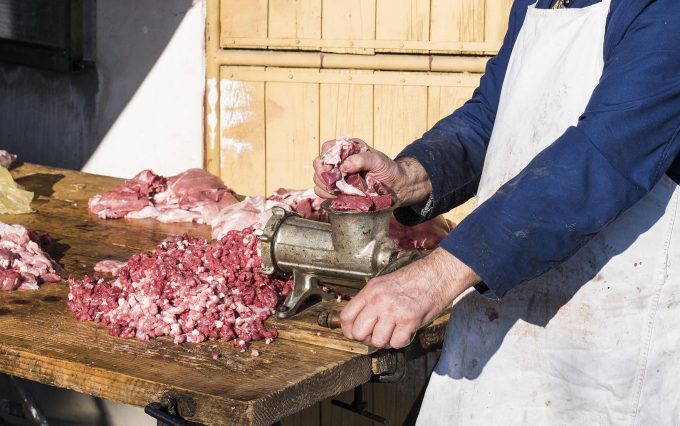
11th October 2022
Fiction
8 minutes read
The Bureaucrat’s Day
translated by Julia Sherwood

11th October 2022
8 minutes read
The bureaucrat’s day started with the purchase of illegally produced sausages. They are superb, his friends claimed, because if they weren’t superb, they would, of course, report the producer, because they might tolerate someone ripping off the state since they hate the state, they spit on it and kick it even though they, too, are the state, but they couldn’t tolerate someone ripping them off personally: if that happened they would instantly turn to the state, embodied, for example, by the bureaucrat whose day started with the purchase of illegally produced sausages.
The first thing he discovered was that standing next to the sausage maker’s old house was his new house – someone had obviously struck gold with the illegal production of sausages, whereas the bureaucrat’s reward for his legal bureaucrat work was just his legal bureaucrat salary and a studio flat in a prefab block, because that’s all that this badly governed society with its disastrous past, only slightly better present, and uncertain future has to offer the bureaucrat, and the bureaucrat doesn’t really deserve anything more; however,
the sausage maker’s new house is actually a horrendous and disgusting architectonic hodgepodge,
just like his old house, and the sausage maker is not ashamed of it, shamelessness being the quintessence of his success, and if someone were to point out to him the hodgepodgeness of his new house, the sausage maker would have another, newer house built in less than two weeks, courtesy of Ukrainian builders toiling for a pittance while he, courtesy of wireless earbuds, would be ceaselessly conducting transactions relating to sausages, and even hot chilies, but mainly sausages as thick as an elephant’s prick – at this point the bureaucrat flew into a rage, feeling humiliated, first by the sausage maker’s houses and then also by this turn of phrase that occurred to him and the fact that he couldn’t for the life of him get rid of, as if he’d been subconsciously persecuted by elephants’ pricks for a long time, as if he’d known for a long time that the illegal business world of this arrogant, enterprising buffoon was built on elephant pricks made of lean pork, pork belly, three percent water, three percent nitrite salt mix, sweet paprika, black pepper, garlic, hot chili, and caraway seed; or maybe not, maybe it was built on elephant pricks made of belly bacon and ten rather than three percent water, natural spices, antioxidants, aromas, stabilizers E3450, E451, E412, salt, or, if that was not the case, this buffoon’s illegal business world was built on elephant pricks cobbled together from god-only-knows-what, and that’s what distinguishes his world from mine, mused the bureaucrat, feeling humiliated and enraged from the moment he laid eyes on the old house and the new, from the moment a caricature of a dog in a polka-dot dog outfit started bouncing about the sausage maker’s legs, from the moment the sausage maker ushered a group of customers into the courtyard of the old house adjacent to the new, and, as if this were of any interest to anyone – it was, in fact, of interest to everyone, apart from the bureaucrat, who was boiling with shame and rage –
he started to show them around the workshop he had built with his own hands,
where he prepared spicy chili pepper rubs and dips, dazzling everyone who was interested – everyone apart from the bureaucrat was interested – with his expertise in the area of sausaging and chillipeppering, although even a caveman must have mastered a basic form of these primitive activities, but the sausage maker went on to proudly draw the attention of the group of customers to the smokehouse at the end of his empty garden, although it would have been justified for anyone who took a look at the garden to accuse him of dereliction of gardening duties, but the bureaucrat kept mum, crushed by shame and ground down by hatred like chilies in an old pepper mill, I do have a new one as well, of course, said the sausage maker pointing to the old pepper mill while talking about the new one, anyway, there was a smokehouse at the end of the garden, although it was not inconceivable that it was not a smokehouse but a warehouse for deer antlers, since the sausage maker didn’t let the group of customers get close to it and they were unable to check for themselves, but that wasn’t really necessary because a warehouse for deer antlers would be just as impressive and in harmony with the basic principles of primitive capitalist spirit of enterprise, the sausage maker paused by a cauldron and kept talking, while those interested in his presentation lit cigarettes as they listened, whereas the bureaucrat was larding himself in shame and spicing himself up with rage, counting the seconds and imagining the kind of problems that might arise once it was his turn to pay for his sausages and he could only find a fifty-euro note in his jacket pocket, the sausage maker wouldn’t give him any change because he doesn’t have a till, that’s the primary appeal of illegal production, and everyone would stare at the bureaucrat with a single question in their eyes:
are you really such a cunt?
They moved on to a workroom furnished with long tables and racks from which the sausage maker’s products swayed slowly and spookily in the morning gloom, some thick and others even thicker, though the customers were interested only in the thickest ones.
Good grief, one of the bureaucrat’s friends exclaimed, enraptured, they’re as big as elephant pricks!
What was that, laughed the others and the bureaucrat also forced himself to laugh even though he felt like crying, as he found the phrase repugnant, but now it took his breath away despite the fact that it had been haunting him for a while, and he stuttered, what-what-what did you say they’re like?
You said they’re as big as what?
As elephants?
The wrapping of the purchases was next on the agenda, and the sausage maker turned out to be an aesthete, expert at assembling baskets of sausages suitable for fiftieth-birthday party celebrations and not just anywhere but right here, in southern Slovakia, right here, in the proximity of Hungary, right here in Central Europe, where pork has been popular since at least the time of the Ottoman raids in the seventeenth century because in order to survive, the ancestors of the bureaucrat, of his group of friends and the illegal sausage producer, that is to say, those ancestors who by some miracle had survived the raids,
managed to exploit the fact that the Muslim invaders did not eat pork, pork being forbidden by their faith,
and so the ancestors of the bureaucrat, his group of friends as well as the illegal sausage producer deliberately started keeping pigs and turning them into sausages and stopped keeping cattle and turning them into steaks, although who knows if all this is not just a myth or a lie, but either way, what happened next was that when the Turks returned at a later date, they found virtually no food for them to pillage even though their Muslim faith allowed them to pillage Christian dogs, which is why Allah is great and generous but, inadvertently, he is also great and generous in relation to infidel dogs, since by forbidding Muslims to eat pork he had enabled the ancestors of the bureaucrat, his group of friends and the illegal sausage producer to survive, given that the enemies of the Muslim faith were not forbidden by their own faith to eat pork, and thus Islam proved to be complementary to Christianity, as if the founders of the two monotheistic religions had reached a fraternal agreement because, had they not reached an agreement, the Muslim Turks would have been able to eat everything and there would have been nothing left to eat for the ancestors of the bureaucrat, his group of friends as well as the illegal sausage producer, and so logic dictates that the ancestors could not have had descendants, including the bureaucrat who in the morning gloom went to purchase illegally produced sausages, took a seat on the only chair in the workroom, but before he did so, the sausage maker made him sample a paste made of rare, extra spicy chili peppers, mind you, I’m not offering you a taste of my rarest, Peruvian paste, he declared, it’s extremely valuable.
And what does its extreme value consist in, the humiliated and enraged bureaucrat was curious to know.
In its big price, the sausage maker enlightened him.







